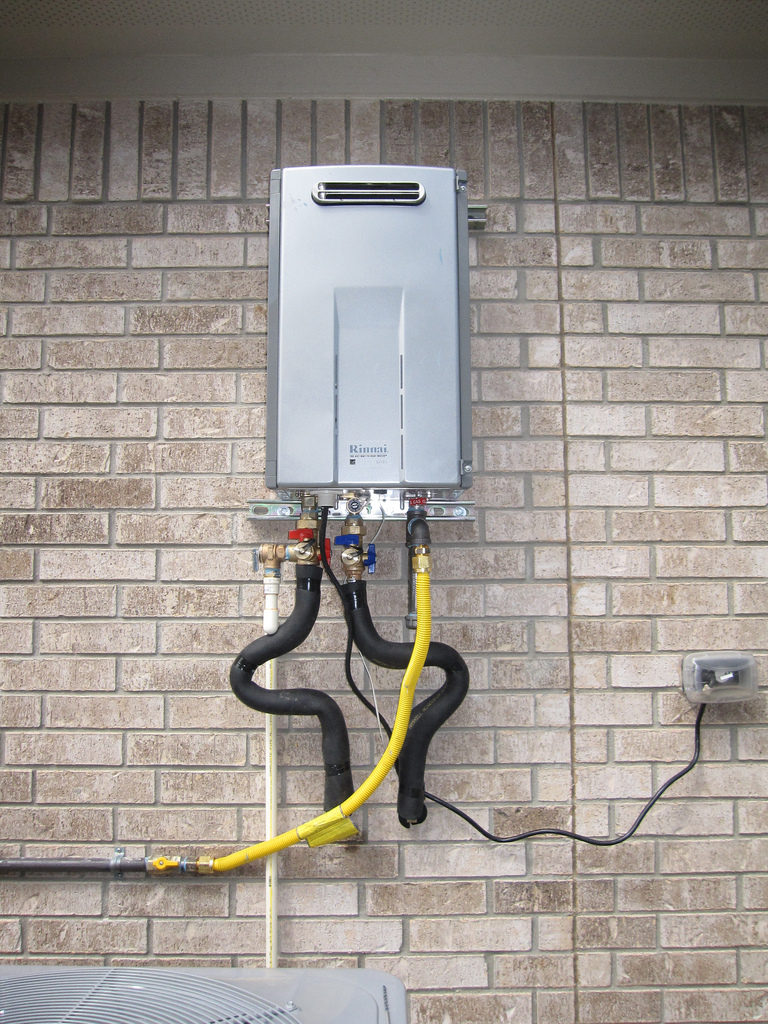All About Tankless Water Heaters


Tankless water heaters are gaining popularity in the homes of many Americans. Why? Their appeal lies in the fact that they provide water only when needed, without the need to store water. Tankless water heaters are also known as demand-type or instantaneous water heaters, and they work by heating water directly rather than through a holding tank, according to the U.S. Department of Energy. When you turn on the hot water in your home, cold water travels to the unit, where it is heated instantly by a gas burner or electric element. As such, tankless heaters give you a constant hot water supply. There are many pros and cons to tankless water heaters, though, so be sure to research the model that’s right for you.

Heating water eats up about 30 percent of your home’s energy budget, according to Consumer Reports. This may be one reason you’re thinking of changing the way you heat your water. A tankless water heater may be an obvious choice, but think about the overall costs and how much it will cost over time. According to the Consumer Reports study, tankless water heaters were found to be 22 percent more efficient when it comes to saving energy than their storage water tank counterparts, equaling a savings of up to $80 per year for the average home owner. Sounds good at first, right? However, when you take a closer look, you see that tankless water heaters are more expensive than storage tank water heaters, in some cases taking up to 22 years to come out even on this deal. This extends beyond the life expectancy of most models, which is about 20 years. Add to this the fact that installation, energy savings, and customer satisfaction vary widely by region, and you may have to take a closer look at this option to ensure it’s right for your particular home and budget. Another con for tankless water heaters is that their outputs can limit the flow rate, says the U.S. Department of Energy. Although gas-fired tankless water heaters feature higher rates of flow over electric versions, they often can’t keep up with the demands of a multiple-person household, especially when you add in the need for simultaneous uses such as taking showers, doing a load of laundry and running the dishwasher.
Tankless water heaters do pose a significant energy savings depending on your usage. If you use 41 gallons or less of hot water per day, you could realize an energy efficiency savings of 24 to 34 percent for demand water heaters over traditional storage tanks, points out the U.S. Department of Energy. They’re slightly less efficient for homes that use 86 or more gallons of hot water a day. According to Energy Star, the average family can save $80 to $100 per year with the installation of a tankless water heater that’s Energy Star-qualified. Although you’ll pay a high initial cost for your tankless water heater over a conventional model, the tankless water heaters have a longer lifespan (over 20 years compared with 15), translating to lower operating and energy bills. They typically contain parts that are easily replaceable too, further extending their life expectancy. No need to store a large tank in your basement, either, which frees up more room for other items.
Making the decision to go with a tankless water heater over a standard storage tank depends on your home, your family’s size, daily hot water use, and budget.
Byline
Aaron Patterson writes on home improvement, plumbing, construction and general home maintenance. Aaron encourages homeowners to visit southernplumbing.com, as they’re an outfit which has affordable water heater replacement costs.
Image credit goes to roger_mommaerts.
